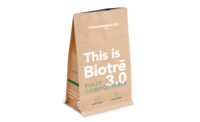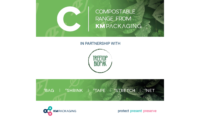Company: H.B. Fuller
Website: www.hbfuller.com
Packaging Snapshot: H.B. Fuller has announced two new compostable adhesive solutions under its worldwide renowned Flextra Evolution brand, which offer many differentiated advantages in terms of sustainability goals and manufacturer benefits.
Increasing environmental awareness of consumers, strict legislation, and the popularized move towards a circular economy is significantly affecting the way we live and do business. As a result, the flexible packaging industry is focused on addressing end-of-life issues, such as recyclability and compostability. In flexible packaging, the adhesive holds the whole structure together and, to make the whole package compostable, the adhesive must also be compostable.
H.B. Fuller has just launched two new compostable solutions for the flexible packaging market: Flextra Evolution SF1000CP/XR2000CP and Flextra Evolution WB1200CP/XR2200CP.
Flextra Evolution SF1000CP/XR2000CP is a 2K solventless adhesive that offers excellent design benefits, such as outstanding sound dampening and excellent adhesion, to a variety of biodegradable film substrates from bar wrap to snack packaging and much more.
Flextra Evolution WB1200CP/XR2200CP, a water-based two-part system that works best with paper-to-film laminations, is fully compostable according to EN13432, ASTM D6400, and is certified through the Biodegradable Products Institute (BPI), North America's leading certifier of compostable products and packaging.
“When people ask for a compostable adhesive, what they are likely asking for is a package with components that can be composted and, now, this can be brought to life with the help of our compostable adhesives throughout the supply chain,” says Wayne Eklund, research scientist. “These new solutions from our Flextra Evolution product line have similar performance to conventional multi-layer packaging adhesives, show great printability and appearance, and work seamlessly with standard equipment. Most importantly, in industrial composting facilities, the adhesives decompose with no toxic residue, microplastics, or other pollutants.”
Compostable adhesives are difficult to formulate without the right polymers and expertise, but the innovation-driven scientists and engineers at H.B. Fuller are highly capable to provide unmatched knowledge and service in collaboration with customers to help them solve their adhesion challenges. For the company, this means going beyond simply developing products that fit a particular adhesive application. It means thoroughly understanding customers’ businesses and processes to respond to changing consumer demand, new product designs, and upcoming regulatory and sustainability efforts.
As part of the broader market move toward sustainability, compostable flexible packaging allows converters and brand owners another tool towards reducing, reusing, composting or recycling. Flexible packaging requires less waste than other packaging types, such as glass, uses less transit resource needs, and utilizes fewer natural resources.
For more information, visit www.hbfuller.com/compostableflexpack.







